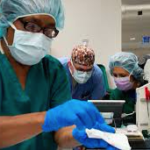Join our EBN Twitter Chat on Wednesday the 1st of November 2017, 8-9pm UK time which will focus the importance of delivering research in a way that reflects contemporary care, and will be hosted by Dr. Susan Hamer, Director of Nursing, Learning and Organisational Development, National Institute for Health Research  (@OfficialNIHR, @dollyblue3)
(@OfficialNIHR, @dollyblue3)
Participating in the Twitter chat requires a Twitter account; if you do not already have one you can create an account at www.twitter.com. Once you have an account contributing is straightforward, you can follow the discussion by searching links to #ebnjc (the EBN chat hash tag) and contribute by sending a tweet (tweets are text messages currently limited to 140 characters), you need to add #ebnjc to your tweet as this allows everyone taking part to view your tweets.
A recent clinical visit shadowing a clinical research nurse provoked a number of questions that I thought might be useful to share. My colleague was busy supporting a research study in cancer care, which is a large study across a number of sites and has been running for a number of years. Part of her role involves following up patients; this follow up activity involved reviewing patients attending a clinic, completing a long paper questionnaire and some physiological tests. The patient we reviewed was so supportive of the work, but had had a challenge parking, finding the clinic and then finding the nurse! For me it was easy to see that much of the consultation would not normally have been carried out this way; the paper questionnaire could have been done on line and made immediately available to the researchers, the physiological data could have been sourced from GP records or collected by the patient themselves with the right equipment. The whole episode felt out of step with normal clinical practice. There was so much that was inefficient and dated that the research and its design was already looking outdate before it had even reported. Indeed there are strong patient voices expressing real concerns about research being too slow, too traditional and rapidly being overtaken by ongoing developments, (http://www.npr.org/sections/health-shots/2017/03/03/517796956/patients-demand-the-right-to-try-experimental-drugs-but-costs-can-be-steep), worrying but understandable.
This led me to ask some more questions, that we can discuss in chat…
- How often do health researchers visit clinical settings and look at the amazing advances in technology and contemporary delivery of care?
- Are health researchers using data points that are already part of the clinical pathway or where more immediate evaluative insights could add value to current care?
- Do health researchers design their research for the future or the now?
Both the recent Life Sciences Industrial Strategy (Bell, 2017) and Future of Health survey (Corbett et al, 2017) urge the health research sector to use the latest technologies, to innovate in methodologies and to better understand the potential of new sciences. I guess what characterises the lack of innovation most to me is the lack of the use of digital technologies throughout the research pathway. An example of to an imaginative and successful a well thought out digital strategy used in research can be found at https://www.cloudywithachanceofpain.com/
Other question that will be discussed in the chat will include:
- Patients’ appetite for self-care, collecting and sharing their own data and asking better questions is boundless: do we really engage and codesign research with them?
- Do we get locked into an academic process and forget that research operates in the real world?
- Just as clinical professionals are expected to evidence their commitment to updating their skills in order to maintain their professional registration should there be a similar expectation for health researchers?
- As a researcher think how has technology transformed your personal life, and your work life?
- Have you updated your research practice?
References
Bell, J (2017) Life Sciences Industrial Strategy 30th August Office for Life Sciences.
https://www.gov.uk/government/publications/life-sciences-industrial-strategy
Corbett, J et al. (2017) Future of Health Findings from a survey of stakeholders on the future of health and healthcare in England, Rand corporation.
https://www.rand.org/pubs/research_reports/RR2147.html